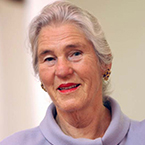
Janet D. Rowley, MD, a cancer genetics pioneer and an inaugural Fellow of the AACR Academy, died Dec. 17, 2013, at the age of 88. Rowley was the Blum-Riese distinguished service professor of medicine, molecular genetics and cell biology, and human genetics at the University of Chicago in Illinois.
Rowley’s discoveries that chromosomal changes cause certain types of leukemia changed the way cancer is understood.
Born April 5, 1925, Rowley attended Hutchins College at the University of Chicago at the age of 15 through a scholarship that combined the last two years of high school with the first two years of college and received her bachelor’s degree in 1944. Although accepted into the University of Chicago’s medical school at the age of 19, Rowley had to wait nine months to attend, as the university’s quota of three women for the class of 65 students was already filled. She graduated from medical school in 1948 and completed her internship at the United States Public Health Service’s Marine Hospital in Chicago.
Rowley worked at various sites throughout Chicago, including a clinic for children with Down syndrome. She gained an interest in cancer and chromosomes in 1962 after learning a new technique for chromosome analysis during a year at Oxford University in the United Kingdom. She used those techniques to study the chromosomes from patients with leukemia when she returned to the United States and worked as an assistant professor at the University of Chicago.
Rowley’s leadership in revolutionizing the understanding of the role of genetics in causing disease has been recognized worldwide by numerous accolades, including the Albert Lasker Clinical Research Award, the Presidential Medal of Freedom, the AACR Lifetime Achievement Award, the AACR-G.H.A. Clowes Memorial Award, the Dorothy P. Landon-AACR Foundation Prize for Translational Cancer Research, the AACR-Women in Cancer Research Charlotte Friend Memorial Lectureship, the National Medal of Science, the Albany Medical Center Prize, and the Japan Prize for Healthcare and Medical Technology.
Rowley had been an honorary AACR member since 1981. She served as associate editor of Cancer Research and was a member of the Council of Scientific Advisors and the Women in Cancer Research Committee.
She was preceded in death by her husband, Donald, a professor of pathology at the University of Chicago, earlier this year. Rowley is survived by three of their four sons and five grandchildren.
Career Highlights
2013 Albany Prize
2012 Japan Prize for Healthcare and Medical Technology
2010 AACR Lifetime Achievement Award
2010 Jesse Stevenson Kovalenko Medal, National Academy of Sciences, Washington, D.C.
2009 Presidential Medal of Freedom
2005 Dorothy P. Landon-AACR Foundation Prize for Translational Cancer Research
2003 AACR-Women in Cancer Research Charlotte Friend Memorial Lectureship
1998 Albert Lasker Clinical Research Award
1998 National Medal of Science
1996 Gairdner Foundation International Award
1991 Elected Member, American Philosophical Society
1989 AACR-G.H.A. Clowes Memorial Award
1989 Charles S. Mott Prize, General Motors Cancer Research Foundation
1984 Elected Member, National Academy of Sciences, Washington, D.C.
1982 Dameshek Prize, American Society of Hematology
1948 MD, University of Chicago